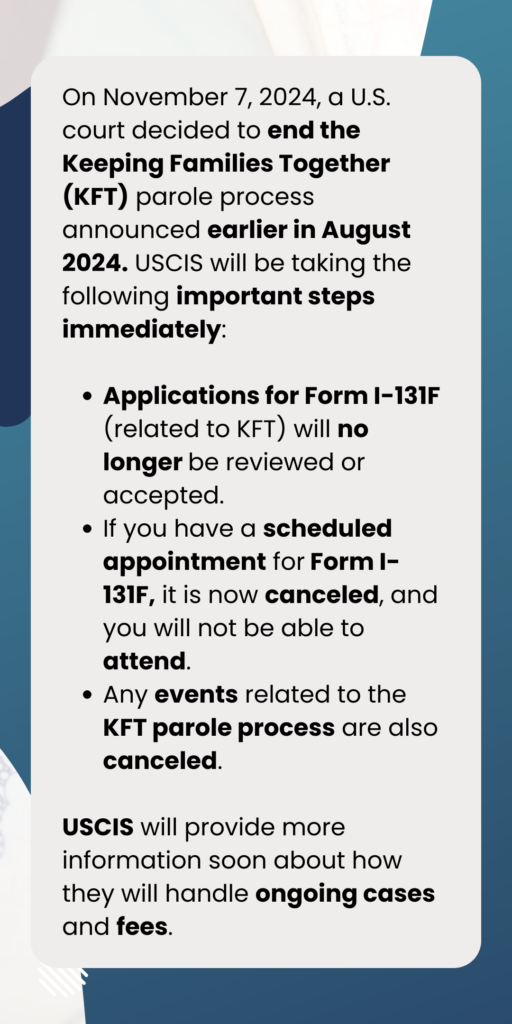Important recent changes to Parole in Place (PIP) under President Biden have expanded its benefits to more families.

In this guide, you'll learn how PIP can help your family to stay together. We'll explore the top five benefits of PIP, showing how it can make a difference for you. Finally, we will look at how you can start preparing for the USCIS Parole in Place application process on Aug 19, 2024!
Guide to the New Benefits of Parole in Place (PIP)
Parole in Place (PIP) is a special benefit in U.S. immigration law. The new benefits of Parole in Place now include all families, not just military families. The Biden Administration announced this discretionary relief measure in June 2024 under the Immigration and Nationality Act.
Parole in Place lets a noncitizen spouse of a U.S. citizen stay in the U.S. temporarily. This program offers important benefits to the noncitizen spouse. The noncitizen spouse can remain in the U.S. without fear of deportation. This allows them to be with their U.S. citizen spouse and family.
It's a form of humanitarian relief, designed to support and keep families together. The program aims to relieve stress and financial strain on family members while they wait for the immigration process to take its course.
It ensures they can focus on supporting their families without worrying about their noncitizen spouse’s immigration status. The benefits of Parole in Place can also be a pathway to legal status for eligible individuals. It's a stepping stone towards obtaining a green card and permanent residency.
Benefit #1: Protection from Deportation
One of President Biden’s key benefits of PIP is protection from deportation. This is a significant relief for families. When granted Parole in Place, beneficiaries are not subject to removal. The benefits of Parole in Place mean that your noncitizen spouse cannot be deported during the parole period.
This protection is granted in one-year increments. It can be renewed, providing ongoing security for families. This benefit is particularly important for families that have been separated because of immigration process delays. Often, children have only one parent available to help the family.
This happens because a parent has to wait in another country until their paperwork is approved. In worst-case scenarios, a parent runs the risk of deportation and cannot work legally as a result. Consequently, families (especially children) endure unfair financial, emotional, and personal hardships.
Parole in Place Will Provide Families with Peace of Mind
The new benefits of Parole in Place show the U.S. government supports families. PIP protects families from deportation, giving them peace of mind. It will provide a sense of stability during uncertain times.
Knowing that family members are safe from deportation will allow parents to support their families without fear of deportation. The new benefits of Parole in Place will reduce the emotional stress associated with the fear of family separation. This peace of mind is invaluable.
Benefit #2: Work Authorization
Another big benefit of Parole in Place is work authorization. People who get PIP can apply for work permits in the United States. This is a game-changer for many families. It opens up job opportunities and helps them become financially stable.
Being able to work legally can greatly improve the quality of life for these families. It allows them to contribute to the economy and become part of the community. However, getting work authorization isn't automatic. You need to go through a separate application process.
Still, the chance to work legally in the U.S. is a major advantage of PIP. It's a benefit that can change the lives of many families. It's another way the benefits of Parole in Place help families and support their financial security.
The Economic Impact of Work Authorization on Families
The economic impact of work authorization on families is huge. It gives them a way to become financially independent and stable. Being able to work legally is a significant benefit of Parole in Place. Parents working and providing for their families can lead to better jobs, more money, and improved living situations.
In short, work authorization can be a step towards a better future for families. It's a benefit of Parole in Place that helps not just one person, but the whole family.
Benefit #3: Pathway to Legal Status
Another benefit of Parole in Place (PIP) may help noncitizen spouses married to U.S. citizens get legal status. It’s not a direct path to citizenship, but it’s an important step. PIP lets eligible people apply for adjustment of status. This means they can apply to become lawful permanent residents.
This is a big benefit for those who entered the U.S. without inspection. Normally, they would have to leave the U.S. to apply for a visa. But with the new benefits of Parole in Place, they can stay in the U.S. while applying for adjustment of status. This avoids the risk of being banned from re-entering.
However, it’s important to remember that the benefits of Parole in Place don’t guarantee a green card. It just provides a way to apply for one. Still, this potential pathway to legal status is a major benefit of PIP. It’s a lifeline for many families dealing with the complex U.S. immigration system.
PIP's Role in Achieving Permanent Residency
PIP is important for getting permanent residency. It removes a major obstacle for those seeking a green card. By granting parole, PIP allows individuals to apply for adjustment of status without leaving the U.S. This is a big advantage.
In short, PIP can be a step towards permanent residency. It’s a benefit that can greatly impact the lives of families.
Benefit #4: Family Unity
One of the main benefits of Parole in Place (PIP) is that it helps keep families together. This is especially important for families, who already face stress and uncertainty because of their service.
The last thing family members need is to worry about their loved ones' immigration status. PIP helps family members who qualify to remain in the U.S. This program aims to prevent families from being separated. It also demonstrates the government's support for all families living in the country.
Keeping families together isn’t just about avoiding separation—it also provides stability and peace of mind. PIP is important for stability and shows how much the U.S. values families' role in the economy.
The Importance of Family Unity
Family unity provides a sense of security and belonging. For families, this is especially crucial. The stability of family life can help ease the stresses life can throw at us.
Keeping families together means sharing responsibilities like childcare, financial support, and emotional care. PIP is key in maintaining this family unity. It’s not just about legal status; it’s about supporting the well-being of families.

Benefit #5: Access to Healthcare and Other Benefits
Another big benefit of Parole in Place (PIP) is access to healthcare and other benefits. This is especially important for all families, especially those with young children. Healthcare is a basic need, and for families, having access to it can be a huge relief.
Parole in Place lets certain people apply for work authorization. They may also get health insurance from their employer. This can provide peace of mind and financial stability for families. Besides healthcare, Parole in Place might also offer access to other benefits, like social services and educational opportunities.
How Access to Benefits Strengthens Families
Access to healthcare and other benefits can significantly help families. These benefits provide a safety net. Healthcare, in particular, is crucial. It ensures that family members can receive the medical care they need.
Other benefits, such as educational opportunities, can provide a pathway to better jobs and financial stability. This can relieve the financial stress often faced by families. PIP offers legal protection and improves the well-being of parents and children. It's a comprehensive program designed to support those who work in the United States economy.
USCIS Accepting Applications Since Aug 19, 2024
USCIS has begun accepting Parole in Place applications since August 19, 2024. You can refer to the Federal Register for more detailed information about the PIP program. Please note the details about Parole in Place are based on current guidelines and might change.
Immigration laws and procedures can be updated by authorities at any time. Please consult with an immigration lawyer for the most current information and advice about your situation.
Noncitizen Spouses Can Begin to Gather These Documents
Being prepared will help you be ready when USCIS begins accepting Parole in Place applications.
- Marriage Certificate.
- Proof of identity.
- Proof of your spouse’s U.S. citizenship.
- Proof of staying in the United States for 10 years.
- For Noncitizen Children: Proof of the child’s relationship to the noncitizen parent (e.g., birth certificate or adoption decree).
- For Noncitizen Children: Proof of the parent’s valid marriage to a U.S. citizen as of June 17, 2024.
- For Noncitizen Children: Evidence of the child’s presence in the U.S. as of June 17, 2024.
The future benefits of Parole in Place look promising, especially with the Biden Administration's support for expanding the program. The expansion of PIP benefits means broader eligibility criteria and increased protections for you and your family.
Get all your questions answered by scheduling a consultation with a Parole in Place immigration expert today. Get expert guidance to prepare for your application and ensure you're ready for the process!
Posted in: Blog


